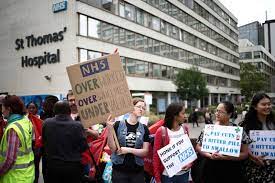Nidhi Razdan
One of the first things you encounter in England are the long, chaotic lines at Heathrow airport. Last year, as I ventured on a visit to the UK post pandemic, it was an an almost three hour long wait at immigration. As I grumbled about it, a close friend who had flown to London to drop her daughter off to college, had a much worse experience.
They waited in line for five hours. Welcome to Great Britain, which is not so great anymore. Don’t get me wrong. I love the UK, I lived there as a child and went to school in a north London neighbourhood. London is still one of my favourite cities, with great food, great weather, some great plays and truly the cliched cultural melting pot. But the last few years have been brutal on the country – from Brexit to Covid and an economic decline that has seen a cost of living crisis affecting large numbers of it’s people.
Today, a great city like London is a shadow of it’s former self, plagued by crime, transport strikes, a healthcare system that is so broken that you are unlikely to get an ambulance in time when you call for one, and a services industry that has been crippled after Brexit. As I write this piece, the latest strike by junior doctors who are part of the legendary National Health Service or the NHS has just ended. This is their 5th strike in recent times over a pay dispute. Another two day walkout has been planned by consultants soon, leading to more massive delays in crucial treatments for patients.
The NHS has already collapsed, with horrific stories of long delays in getting appointments, cancer treatments being postponed, and crucial screenings getting put off. According to the BBC, around 780,000 hospital appointments have had to be postponed because of strike action by NHS staff since December. And new figures show that the hospital backlog has topped 7.5 million for the first time, meaning nearly one in seven people are on a hospital waiting list.
More than 385,000 people have been waiting more than a year to start treatment. The NHS is facing a severe shortage of doctors and other staff, with thousands of European doctors also leaving after Brexit. And then there are strikes by transport workers and teachers – also over pay. Since last year, the UK has been plagued by repeated rail strikes which have affected long distance trains and the lifeline of London – the Tube. Newspapers now regularly publish a calendar of strike action, so that people can plan ahead.
Last year, the army had to be called in to take over immigration counters at the airports, after immigration officials went on strike. Actually the army did a much better job, but that’s another story. After Brexit kicked in in January 2020, the free movement of labour between the European Union and the UK ended in 2021, and now there is a very visible shortage of workers in the services sector. Data says there has been a shortfall of 330,000 people. Inflation has touched 40 year highs, the cost of living crisis has forced many families to choose how long to put their heating on in the dead of winter. The once coveted high street, Oxford Street, is in a state of visible decline as well, with several prominent stores closing, and seedy American candy shops taking their place. Some of these were shut down recently during anti money laundering investigations.
Crime is up in central London, with several stories of people being robbed of their expensive watches outside fancy Mayfair restaurants and in swanky neighbourhoods. I have heard horrible stories from friends who were robbed on the street and now refuse to wear real jewellery when they go out. The police had even set up a special task force to deal with these crimes, with gangs scaring away wealthy investors from London. Data shows that knife crime has also gone up in the UK capital. Will all of this stop me from going back to one of favourite cities? No. Because there is still so much to love about London. And I will always hope that things will get better.
Gulf News







